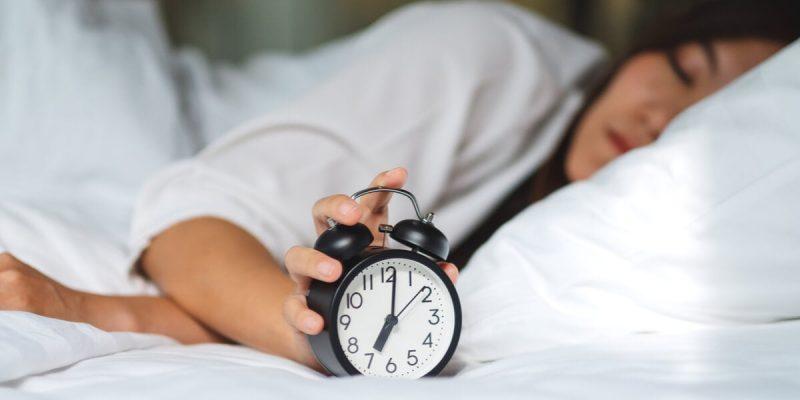Do you need more than two alarms to be able to get up in the morning? As a matter of fact, it’s quite common to feel the desire to sleep just for those ‘five minutes’ more and set the alarm to snooze. However, although it seems somewhat harmless, experts warn that it’s an unhealthy habit. Indeed, scientists have actually addressed the question of how snoozing affects you in the morning.
As a matter of fact, even if you think that those five extra minutes of sleep are helping you to rest, the reality is different. That’s because having more than one wake-up alarm can lead to serious physical and mental health problems. Therefore, the best option is to educate yourself and develop better sleep habits in order to rest in a healthy way.
Bad sleep habits and their health consequences
Today’s society is characterized by speed, innovation, and constant change. there’s a good and bad side to this. On the one hand, technological advance allows you to enjoy the comforts that make life easier. However, it’s also associated with more intense and frequent demands on you.
You study, work, form a family, have friends, etc. In fact, sometimes, you get the impression that there just aren’t enough hours in the day to meet all the demands there are on you. Thus, you tend to have unhealthy sleep habits.
One study has pointed out that sleep disorders affect society worldwide (Chattu et al, 2018). Furthermore, a lack of rest is linked to cardiovascular disease, anxiety, stress, depression, and other conditions.
You may well have adopted the habit of postponing your alarm in order to be able to rest a little more. The reason this habit is so common is that you tend not to understand how snoozing in the morning affects you. In fact, you probably even think it’s a positive action because it’s ‘lengthening’ your sleep time.
However, snoozing is a negative habit that can harm you in several ways. In addition, this habit can be a sign of an undiagnosed sleep disorder that requires attention.
How snoozing affects you in the morning
You often hear or read about the importance of getting at least eight hours of sleep a night. For this reason, you might think that snoozing is a good option to get enough sleep. However, one important thing you must understand about sleep is that it’s a cycle.
When you go to bed, your body starts a series of functions that regenerates itself. In order to be restorative, your sleep cycle should last at least eight hours, uninterrupted. This means that splitting up your sleep, as happens when you snooze, affects your natural sleep cycle.
To better illustrate how snoozing affects you, think of your sleep cycle like a video game. If for some reason, you lose, you have to go right back to the first level. The same happens with sleep, every time you wake up, you cancel your sleep cycle and, when you go back to sleep, you start a new one.
The successive interruptions of sleep end up altering the functioning of your brain and the rest of your body. Consequently, you tend to feel more tired when you get out of bed even though you ‘slept a little more’. In the long term, this has negative health consequences.
Therefore, although it may be tempting to snooze for that extra ten minutes, it’s preferable to get up immediately. Otherwise, you may experience some of the following health problems:
- Fatigue.
- Poor performance at work, school, etc.
- Irritability.
- Trouble concentrating.
- Memory failures.
- Increased appetite.
- Altered mood.
According to research with both adolescents and adults, sleep habits work as a predictor of mental health. For this reason, behaviors such as going to bed late, using your cell phone before bed, or sleeping late on workdays can cause disturbances. (Zhang et al, 2018).

Recommendations for better rest
In addition to avoiding using multiple alarms to wake you up, developing better sleep hygiene is critical. This is achieved by adopting a series of healthy habits in your daily life to promote a good night’s sleep. Here are some of the behaviors that you should implement in order to get more rest:
- Don’t consume caffeine any later than six hours before sleeping. This isn’t only limited to coffee, it also applies to sodas and energy drinks.
- Avoid eating two hours before bed and try to eat a light dinner.
- Silence all electronic devices. In fact, if possible, leave them outside the bedroom.
- Reduce lighting to a minimum.
- Try to have a comfortable mattress that’s in good condition.
- Adjust the room temperature to make it comfortable.
- Don’t use your room as a place to study.
Finally, apart from understanding how snoozing affects you in the morning, it’s important to mention your kind of alarm. It isn’t advisable to have extremely loud alarms as these may stress you when you wake up. A standard sound at normal volume should be sufficient.
The post How Snoozing Affects You In the Morning appeared first on Exploring your mind.



















Comments